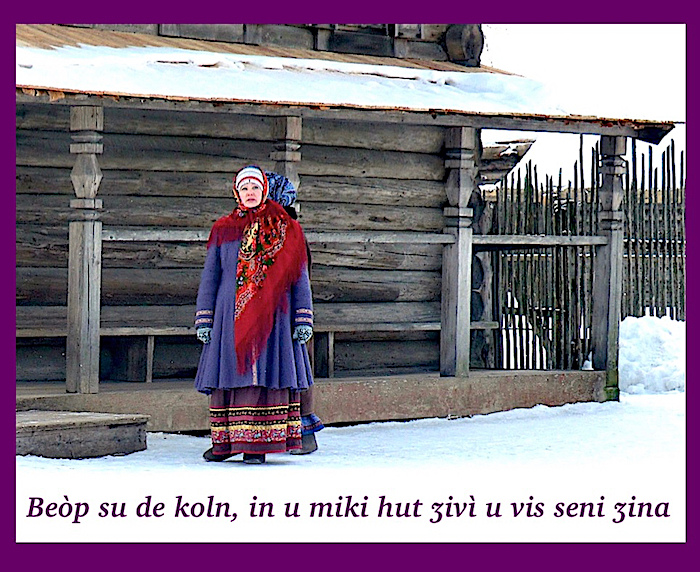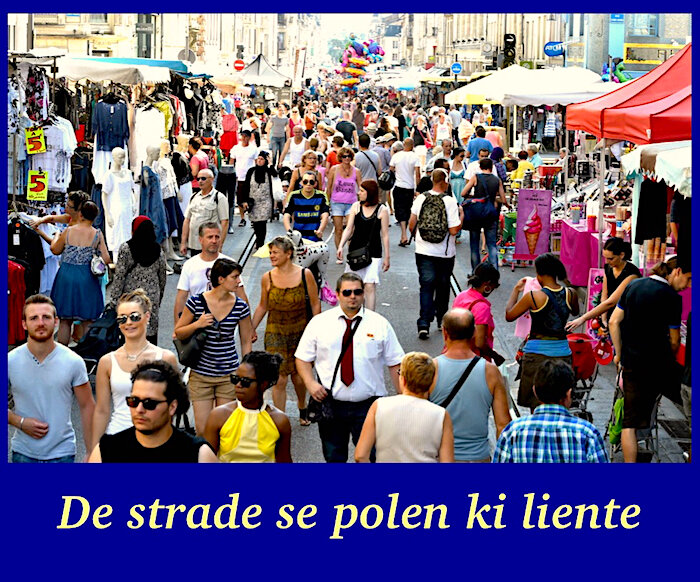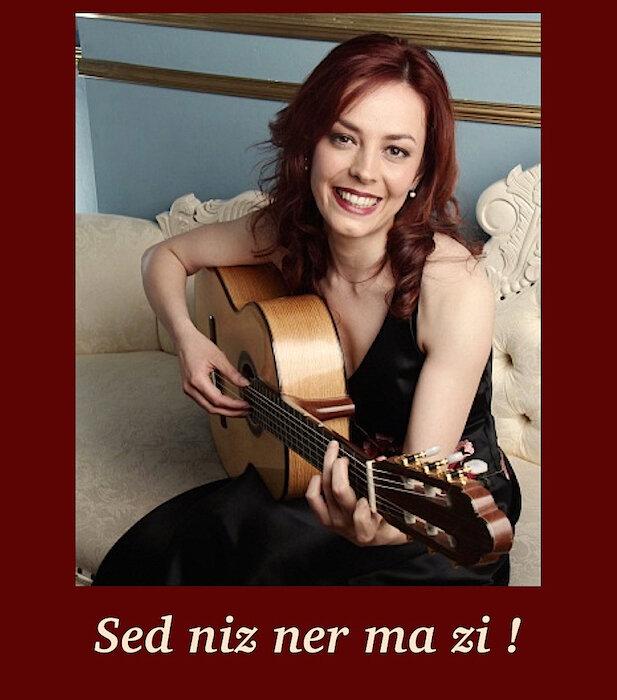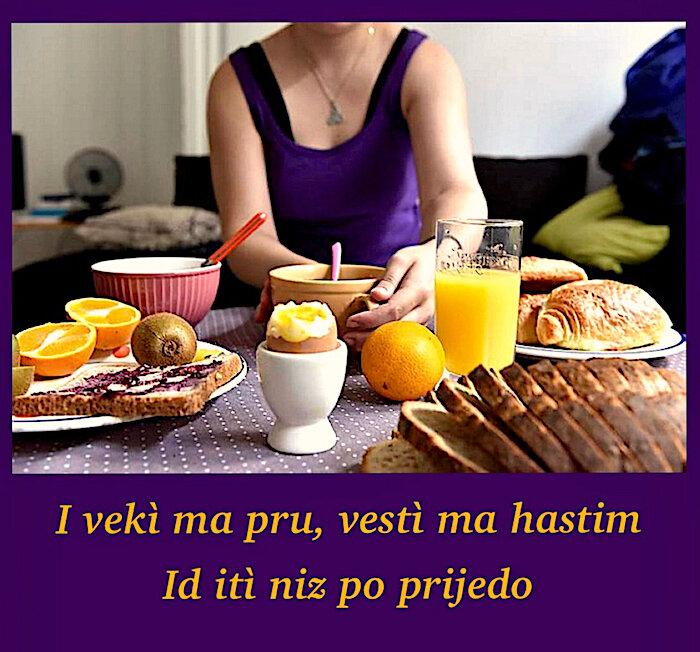UROPI: Un eglivez intra lingas - Un équilibre entre les langues - A balance between languages
★ ★ ★
* Uropi Nove 134 * Uropi Nove 134 * Uropi Nove 134 *
★ ★ ★
Je s’ priʒe anlezi findo un eglivez su ruk un elefanti
★ ★ ★
Un eglivez intra lingas
★ ★ ★
De majsan lingas we vid nomen « intranasioni eldilingas » (IEL) se in fakt mol poj intranasioni. De majsan tem lu nem op vorde usfalim zi id za od u limiten numar lingus, insanim od Westeuropan lingas. De maj konen od la wim Volapük id Esperanto se nun usnemad… Pos Esperanto id ji ‘dota-lingas’ wim Ido, je stì u tendad do maj id maj ‘naturi’ lingas, bazan de struen lingas, po samp, uskluzim su Romaniki lingas, wim Occidental, Interlingua id maj novem Lingua Franca Nova (LFN), o su Slavi lingas, wim Slovio. Da sì ne u pej idea par de majsan liente se gonvoli lero artimaken lingas, ba altenzatim je detì da lingas min id min intranasioni.
Un od de cevi principe Uropi se so os intranasioni te mozli, id somtemim stajo os naturi te mozli. Pardà nu av uscepen de komùn Indeuropan rode. Dod inìz da rode se intranasioni: lu agenì vorde we vid jok uzen odia in mole lingas in mold. Vorde moj so maj o min intranasioni wim, po samp kafa (od Arabi) wen un moz findo in bemìn 68 lingas, gonim a dessous (udeveste) wen un find in solem du lingas (Franci id Doski).
In Uropi, nu av talvos proben atogo un eglivez intra lingas, uscepan rode wen un find in mole lingas, in vari lingu famile, apìtan jakivos mozli nemo vorde od u solen linga wim dik no de miki fraze benìz. Di 25 fraze ven od u list 200 frazis in Engli, daven su u sitia struen lingus.
In roj se de Slavi lingas (S): Rusi, Kroati/Serbi, Tceki, Slovaki, Slovèni, Polski, Bulgàri…
In glen, de Romaniki lingas (R): Latini, Itali, Franci, Espàni, Portugi, Rumàni, Katalàni…
In blu, de Germàni lingas (G): Engli, Doski, Nizilandi, Dani, Swedi, Norveji…
In nar Indeuropan (I-E), Greci, id mole alten lingas: Albàni, Balti lingas, Hindi, Bengali, Gujarati, Armèni, Persi, Kurdi, Kelti lingas…
★ ★ ★
★ ★ ★
Un équilibre entre les langues
★ ★ ★
La plupart des langues que l’on appelle « langues auxiliaires internationales » (LAI) sont en fait très peu internationales. Souvent, elles reprennent des mots ça et là, au hasard dans un nombre limité de langues, essentiellement ouest-européennes. Les plus connues d’entre elles comme le Volapük et l’Espéranto ne font pas exception… Après l’Espéranto et ses ‘langues-filles’ comme l’Ido, nous observons une tendance vers des langues de plus en plus ‘naturelles’, basées par exemple, exclusivement sur les langues romanes, comme l’Occidental, l’Interlingua et plus récemment la Lingua Franca Nova (LFN), ou sur les langues slaves comme le Slovio. Ce n’était pas une mauvaise idée car la plupart des gens sont peu disposés à apprendre des langues artificielles, mais parallèlement cela rendait ces langues de moins en moins internationales.
Un des principes fondamentaux de l’Uropi est d’être aussi international que possible, et en même temps de rester aussi naturel que possible. C’est pourquoi nous avons choisi les racines indo-européennes communes. Depuis le départ, ces racines sont internationales: elles ont donné naissance à des mots qui sont encore utilisés aujourd’hui dans de nombreuses langues du monde. Les mots peuvent être plus ou moins internationaux comme, par exemple café (d’origine arabe), que l’on retrouve dans au moins 68 langues, contrairement à dessous (sous-vêtements) que l’on retrouve dans seulement deux langues (le français et l’allemand).
En Uropi, nous avons toujours essayé d’atteindre un équilibre entre les langues, en choisissant des racines que l’on retrouve dans de nombreuses langues, dans plusieurs familles linguistiques, en évitant chaque fois que possible d’emprunter des mots à une seule langue.
C’est ce que nous montrent les 25 petites phrases ci-dessous; elles sont tirées d’une liste de 200 phrases en anglais, disponibles sur un site dédié aux langues construites.
En rouge, les langues slaves (S): russe, croate/serbe, tchèque, slovaque, slovène, polonais, bulgare…
En vert, les langues romanes (R): Latin, italien, français, espagnol, portugais, roumain, catalan…
En bleu, les langues germaniques (G): anglais, allemand, néerlandais, danois, suédois, norvégien…
En noir l’indo-européen (i-e), le grec et beaucoup d’autres langues: albanais, langues balte, hindi, bengali, goujarati, arménien, persan, kurde, langues celtiques…
★ ★ ★
★ ★ ★
A balance between languages
★ ★ ★
Many languages called IAL « international auxiliary languages » are in fact very little international. Most of the time they pick up words at random from a limited number of languages, essentially from West-European languages. The best known of them, like Volapük and Esperanto are no exceptions… after Esperanto and its ‘daughter-languages’ like Ido, we could observe a tendency towards more and more ‘natural’ languages, basing the conlangs exclusively on Romance languages, for example, as with Occidental, Interlingua and more recently Lingua Franca Nova (LFN), or on Slavic languages, like Slovio. This was not a bad idea, for most people are reluctant to learn artificial languages, but on the other hand it made those languages less and less international.
One of the basic principles of Uropi is to be as international as possible, and at the same time as natural as possible. This is why we chose the common Indo-European roots. From the start, these roots have been international: they gave birth to words that are still used today in many languages in the world. Words may be more or less international like coffee (from Arabic) for example that can be found in at least 68 languages, as opposed to dessous (underwear) that can be found in only two languages (French and German).
In Uropi we have always tried to reach a balance between languages, by choosing roots that can be found in a lot of languages, in several language families, avoiding as much as possible to take words from a single language, as the following small sentences below show. These 25 sentences were picked up from a list of 200 sentences in English, that were available on a conlang website.
In red we have Slavic languages (S): Russian, Croat/Serb, Czech, Slovak, Slovenian, Polish, Bulgarian…
In green, Romance languages (R): Latin, Italian, French, Spanish, Portuguese, Romanian, Catalan…
In blue, Germanic languages (G): English, German, Dutch, Danish, Swedish, Norwegian…
In black, Indo-European (I-E), Greek, and many other languages: Albanian, Baltic languages, Hindi, Bengali, Gujarati, Armenian, Persian, Kurdish, Celtic languages…
★ ★ ★
Moz ti frat danso bun ? Can your brother dance well ? Est-ce que ton frère sait bien danser ?
S: moz < мочь, moći, moci, móc, môcť
i-e: ti < tu/o, ton, tvoj, dein, tvůj, tera, tavo < i-e *tewe, *tewos
R: frat < frater, frate, fratello, brat < i-e *bʰréhₐter-
rgs: danso < danser, danzare, tanzen, dansa, танцевать, tancovat
R: bun < bun, buono, bueno, bon
★ ★ ★
★ ★ ★
Itì ap de man ? Did the man go away ? Est-ce que l’homme est parti ?
S: itì < идти, ići, jít, iść, iti, ba iet, eiti < i-e *ei-, *itā
grG: ap < από, ab, af, ab- < i-e *apo
G: de < de, der the, den
G: man < man, Mann, mand, hi manuša < i-e *manu-(s)
Ven ti sesta po ta ? Is your sister coming for you ? Est-ce que ta soeur vient pour toi ?
R: ven < venir, venire, veni, alb vjen
i-e: ti…
G.S. sesta < sister, søster, сестра, sestra, siostra < i-e *swésōr
R: po < por, pour, per
i-e: ta < te, ti, тебя, tebe, tě, tumhe, te, dich, dig < i-e *te
Av de nersane iten ap po hima ? Have the neighbours gone away for the winter ? Est-ce que les voisins sont partis pour l’hiver ?
R: av < avoir, avere, avea, have…
G: de < de, der, the, den
G: nersan < ner < near, nær, nära, nah + san < so
S: iten < идти, ići, jít, iść, iti, ba iet, eiti < i-e *ei-, *itā
grG: ap < από, ab, af, ab- < i-e *apo
R: po < por, pour, per
R.S: hima < hiems, hiver, zima, зима, gr kheimonas, hi. him, ba. ziema, alb. dimër, arm. dzmer, ke. goañv < i-e *ǵheim-, ǵhiem-
★ ★ ★
★ ★ ★
Kan ve ti goste od London aveno ? When will your guests from London arrive ? Quand tes invités de Londres vont-ils arriver ?
R: kan < quan, cand, quand, quando, cuándo
G: ve < vil, will, werde, vais, voy, voi
i-e: ti…
S: gost < гост, gość, gost, host, Gast, guest < i-e *gʰostis
S: od < от, od, od, od, от < i-e *hₐet
R: aveno < a + venir, venire, veni
Βeòp su de koln, in u miki hut, ʒivì u vis seni ʒina
On top of the hill, in a small cabin, lived an old wise woman.
En haut de la colline, dans une cabane, vivait une vieille femme sage.
G: beòp < be-, op, up, auf, upp, hi ūpar < i-e *(h₁)uper
R: su < su, sur, sobre
G: de < de, der, the, den
R: koln < colle, collina, colina, холм
G.R: in, în, en, in, i, gr εν, ba į, ie-, ke. yn, i < i-e *h₁en(i)
R: u < un, un,
gr: miki < μικρός, mic
G: hut < Hütte, hut, hydda, hytte, hutte
S: ʒivì < живой, živ, živý, żywy, hi jīvit, be jībita < i-e *gʷiw-
G: vis < vis, wise, wijs, weise < i-e *weid-
ba: seni < senas, sens, ke. sean, hen, arm hin, la senex < i-e *sénos
S: ʒina < žena, женщина, żona, жена, kur jin, gr γυναίκα < *gʷénhₐ
★ ★ ★
★ ★ ★
Ι ve so felic ito za. I’ll be happy to go there. Je serai heureux d’y aller.
G.R.S: i < I, ik, ich, io, yo, я, ja, já < i-e *h₁eǵ > gr εγώ
G: ve…
i-e: so < sono, soy, suis, sein, zijn, sam, som, jsem, su < *h₁es-
R: felic < felix, felice, feliz, fericit
S: ito…
Ur. za < ça, allá, da, þar, там, tam, tamo, gu tyāṁ,
Nu doʒev jedo maj lanim. We should eat more slowly. Nous devrions manger plus lentement.
R: nu < nous, noi, nos, нас, nas, nás < i-e *nóh₁, *nos
S: doʒev < должен, dovere, doit, alb duhet
S: jedo < едим, jedem, jedo, jedí, jedia, jedzą, æde, äta, eat, eten < i-e *h₁éd-
R: maj < mai, mais, más, més, more, mehr
G: lan < langsam, langzaam, lansgom, lent, lento, ba lēns, lėtas
Vu moz jego pos de skol. You can play after school. Vous pouvez jouer après l’ école.
R.S: vu < vous, voi, vos, vós, вы, vi, wy, vy < i-e *wóh₁, *wos
S: moz < мочь, moći, moci, móc, môcť
R: jego < jugar, jogar, juca, giocare, jouer
S: pos < после, po, posle, potom, alb pas, ba pēc, paskui, la post < i-e *pos-, *posti
G: de < de, der, the, den
gr: skol < skholeion, scuola…, skola…, škola…, alb shkollë, ba skola, ke scoil, ysgol…
★ ★ ★
★ ★ ★
De strade se polen ki liente. The streets are full of people. Les rues sont pleines de monde.
G: de < de, der, the, den
R: strade, strada, straat, Straße, street, ke sráide, stryd
i-e: so…
S: polen < poln, полный, pełny, plný, пълен, ba pilns, pilnas < i-e *pl̩h₁nós
gr: ki < και, cu
G.S.R: liente < Leute, lieden, люди, ljudi, lidé, ludzie, gente, gente, gent
Av tale fole falen ap de drev ? Have all the leaves fallen off the tree ? Toutes les feuilles sont-elles tombées de l’arbre?
R: av < avoir, avere, avea, have…
R.G.S. tal < tout, tutto, todo, toate, al, all, alles, alt, целый, celý, cel, cały.
R: fole < foglia, folha, feuille, full, gr. φύλλο
G: falen < fall, fallen, falde, fala
grG: ap < από, ab, af, ab- < i-e *apo
G: de < de, der, the, den
S: drev < дерево, drzewo, drevo, drvo, дърво, tree, træ, gr δέντρο < i-e *dóru
Sed niz ner ma zi ! Sit down here near me ! Assieds-toi ici près de moi !
S: sed < sedeti, sedět, siedzieć, сидеть, sedeo, sedere, şedea, sit, sitzen, ba sēdēt, sėdėti < i-e *sed-
S: niz < вниз, низкий, nizak, nízký, niski, nizek, nieder, ned, hi nīch, be nichu, gu nīcha < i-e *ni
G: ner < near, nær, nära, nah
i-e: ma < me, mi, mig, меня, mě, mujhe, min, man, mane, mé,më < i-e *me
Ur. zi < -ci, ací, здесь, zde, ba čia, est siin, siia
★ ★ ★
★ ★ ★
Lu oprì tale dore id fente. They opened all doors and windows. Ils ont ouvert toutes les portes et fenêtres
R: lu < loro, li, le, les, los, las
R.G. oprì < aprire, abrir, ouvrir, open, openen, öppna, öffnen
R.G.S. tal < tout, tutto, todo, al, all, allles, alt, целый, celý, cel, cały
G.S. dor < door, dør, deur, дверь, drzwi, dveře, alb derë, arm dur, hi dvār, per dar ku derî, ba durvis, durys, gr θύρα, ke doras, br dor < i-e *dʰwṓr
R.G.S. id < y, i, i, i, i, and, und
R. fent < fenêtre, finestra, fenestra, Fenster, venster, fönster
Stop ti jeg id staj tici. Stop you game and stay still. Arrête ton jeu et reste tranquille.
G. stopo < stop, stoppen, stoppe, stoppa
i-e: ti…
R: jeg < juego, jogo, joc, jeu
R.G.S. id…
R.G.S. staj < sta, stare, stay, stanna, остаться, zostać, ostati, zůstat < i-e *steh₂-
S: tici < тихий, tih, cichy, tichý, тих
Do de fend somu, dias vid mol maj kurti.
Toward the end of summer the days grow much shorter.
Vers la fin de l’été les jours deviennent beaucoup plus courts
S: do < до, do, do, do, до, to, zu, toe < i-e *do, *de
G. de < de, der, the, den
R.G. fend < fin, fine, fim + end, Ende, einde, ända
G. soma < sommar, summer, Sommer, ke samhradh < i-e *sem-
R: dias < dias, dias, dies, ziuă, день, dzień, deň, den, ba diena, hi din, gu, ma divas < i-e *dye(u)-*dei-no-
G. vid < wird, wordt < i-e *wert- (= virto)
R: mol < molto, molt, mult, multus
R: maj < mai, mais, más
R.G.S. kurti < court, corto, curto, curt, scurt, kurz, kort, короткий, krótki, kratak, krátký, alb shkurt
★ ★ ★
★ ★ ★
He cepì u mandipol kamitis id basì la in de lag.
He seized a handful of pebbles and threw them into the lake.
Il saisit une poignée de cailloux et les jeta dans le lac.
G. he < he, hij, han
R: cepì < capio/cepi, acchiappare, captar, alb kap < i-e *kap-, ba čiupti, sčepati, chopit, chapać
R: u < un, un,
R.G.S. mand < mano, main, mão + hand, Hand, hånd, полный, poln…
S: kam, -it < камень, kamen, kámen, kamień, ba akmens, akmuo < i-e *h₄ékmōn
R.G.S. id…
S: basì < bacati, бросать, házet
R: la < li,le, les, los, las
G.R: in, în, en, in, i, gr εν, ba į, ie-, ke. yn, i < i-e *h₁en(i)
G. de < de, der, the, den
R: lag < lago, lac, llac, lake, лужа, lokva, louže, локва, gr lakkos, ke loch < i-e *lokús
Nu mozì vizo na in de vod. We could see ourselves in the water. Nous pouvions nous voir dans l’eau.
R.S: nu < nous, noi, nos, нас, nas, nás, alb ne < i-e *nóh₁, *nos
S: mozì < мочь, moći, moci, móc, môcť
S.R: vizo < видеть, videti, vidět, widzieć, vedere, vedea, ver, voir, veure < i-e *weid-
R: na < nous, ne, nos, нас, nas, nás, alb ne < i-e *nóh₁, *nos
G.R: in, în, en, in, i, gr εν, ba į, ie-, ke. yn, i < i-e *h₁en(i)
G. de < de, der, the, den
S: vod < вода, voda, woda…, water, vand, vatten, gr ύδωρ, ba ūdens, vanduo < i-e *wódr̩-
★ ★ ★
★ ★ ★
Ce sì vokan sio som. She was talking to herself. Elle parlait toute seule.
G. ce < she, ze, sie, be sē, ke sí
i-e: sì, V/so… < *h₁es-
i-e: vokan < voco, vox, voce, voix, voz, hi, gu, ma vachan < i-e *wekʷ-
R.G.S: sia < себя, -ся, sebe, se, się, se, si, sich, zich, sig, hi svayan, be sbaẏaṁ < i-e *séwe
S: som < сам, sam, sám, same, samme, samma, gr όμος, hi, be samān < i-e *somos
In di sta nu ve mako ni dom. In this place we will make our home. Dans cet endroit nous feront notre maison.
G.R: in, în, en, in, i, gr εν, ba į, ie-, ke. yn, i < i-e *h₁en(i)
G. di < diese, dit, this, di, arm da, mal din
G. sta < Stelle, sted, staður, ställe, hi sthān, be sthān, ke stádas < i-e *stéh₂tis
R. S: nu < nous, noi, nos, нас, nas, nás < i-e *nóh₁, *nos
G: ve < vil, will, werde, vais, voy, voi
G: mako < make, maken, machen
R.S: ni < notre, nostro, nuestro, наш, naš, nasz, náš < i-e *nóh₁, *nos
S: dom < дом, dom, dům, domus, gr δόμος, arm doun < i-e *dóm(hₐ)os
Ce vest sia in u ʒel klad. She dresses with a yellow dress. Elle s’habille avec une robe jaune.
G. ce < she, ze, sie, be sē, ke sí
R: vest < vestire, vestir, vêtir, alb veshje, ke feisteas, gwisg, hi, gu vastra, be bastra < i-e *wes-tro-
R.G.S: sia < себя, -ся, sebe, se, się, se, si, sich, zich, sig, hi svayan, be sbaẏaṁ < i-e *séwe
G.R: in, în, en, in, i, gr εν, ba į, ie-, ke. yn, i < i-e *h₁en(i)
R: u < un, un,
S: ʒel < жёлтый, żółty, žluť, žut, жълт, giallo, galben, yellow, geel, gelb < i-e *ǵʰel-, *gʰel-
G. klad < Kleid, kleding, kjole, klänning, clad, ba kleita
★ ★ ★
★ ★ ★
Un doʒ meno for akto. You have to think before you act. Il faut réfléchir avant d’agir
R: un, uno
S: doʒ < должен, dovere, doit, alb duhet
alb: meno <mendoj, menen, mene, mena, mens, mente, ba manyti < i-e *men-
G. for < före, før, foran, vor, voor, before
R: akto < ago, agire, actuar, agir, act
Ι spekì de snevifloke falan. I watched the snowflakes falling. Je regardais les flocons de neige tomber
G.R.S: i < I, ik, ich, io, yo, я, ja, já < i-e *h₁eǵ > gr εγώ
i-e: speko <i-e *(s)peḱ-, spähen, speja, spicio, specto, spiare, espiar, špehovat, szpiegować
G. de < de, der, the, den
G.R.S: snev < sneeuw, snö, neve, nieve, снег, sneg, ba sniegs, sniegas, ke sneachta < i-e *sneigʷʰ-
R: flok < floccus, fiocco, floco, flocon, flake, Flocke, vlok, vločka, alb flok
G: falan < fall, fallen, falde, fala
Se tu sat varmi num ? Are you warm enough now ? As-tu assez chaud maintenant ?
i-e: se < sono, soy, suis, sein, zijn, sam, som, jsem, su < *h₁es-
i-e: tu < tu, tú, ты, ty, ti, du, du, ba tu, alb ti, hi tum, tū, per tu, ku tu, ke tú, ti arm du < i-e *túhₓ
R: sat < satis, sazio, saciado, sătul, satt, sated, сытый, sit, syty, ba sotus, sāts < i-e *séh₂tis
G: warmi < warm, varm, värma, gr θερμός, per garm, arm jerm, ku germ, hi garam < i-e *gʷʰermós,
G: num < nu, nu, nunc, ныне, ну, nyní, nu, ba nu, nūnai, ku niha < i-e *nu-
★ ★ ★
★ ★ ★
I vekì ma pru, vestì ma hastim id itì niz po prijedo.
I woke up early, got dressed hastily and went down for breakfast.
Je me suis réveillé tôt, me suis habillé à la hâte et suis descendu pour prendre le petit déjeuner
G.R.S: i < I, ik, ich, io, yo, я, ja, já < i-e *h₁eǵ > gr εγώ
G: vekì < wake, wecken, vække, vakna, svegliare, réveiller
i-e: ma < me, mi, mig, меня, mě, mujhe, min, man, mane, mé, më < i-e *me
G: pru < früh, vroeg, presto, gr πρωί, πρώιμος, πρόωρος < i-e *prō-
R: vestì < vestire, vestir, vêtir, alb veshje, ke feisteas, gwisg, hi, gu vastra, be bastra < i-e *wes-tro-
G: hastim < Hast, haast, haste, hâte, ke hast, hast
R.G.S. id < y, i, i, i, i, and, und
S: itì < идти, ići, jít, iść, iti, ba iet, eiti < i-e *ei-, *itā
S: niz < вниз, низкий, nizak, nízký, niski, nizek, nieder, ned, hi nīch, be nichu, gu nīcha < i-e *ni
R: po < por, pour, per
R: prijedo < primus, primo, первый, prvi, ba pirmas, hi pratham, gr πρώτος < i-e *prhₓ-uo-, *pro-tmhₓo-
S: jedo < едим, jedem, jedo, jedí, jedia, jedzą, æde, äta, eat, eten < i-e *h₁éd-
Numar vordis : S.48, R.60½, G.56, i-e 84 od 160 vorde
i-e 52,5%, R = 37,8%, G = 35%, S = 30%
Ba 10%, Gr 9,37%, Hi 7,81%, Alb 6,25%, Ke 5,93%, Arm 2,19%


/https%3A%2F%2Fprofilepics.canalblog.com%2Fprofilepics%2F2%2F7%2F277026.jpg)














/http%3A%2F%2Fstorage.canalblog.com%2F07%2F27%2F321345%2F126713582_o.jpg)
/http%3A%2F%2Fstorage.canalblog.com%2F06%2F57%2F321345%2F124102745_o.jpg)
/http%3A%2F%2Fstorage.canalblog.com%2F64%2F66%2F321345%2F107671202_o.jpg)
/http%3A%2F%2Fstorage.canalblog.com%2F41%2F26%2F321345%2F56836319_p.jpg)